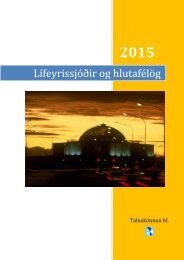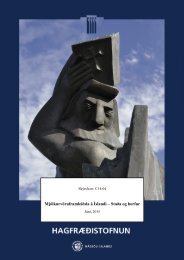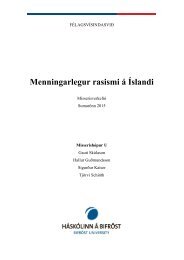You also want an ePaper? Increase the reach of your titles
YUMPU automatically turns print PDFs into web optimized ePapers that Google loves.
WORLD REPORT 2016<br />
HUMAN RIGHTS WATCH<br />
in 2016, centers on a foreign-funded workshop to train Moroccans in the use of a<br />
smartphone application to practice “citizens’ journalism.”<br />
Morocco expelled several foreign visitors who arrived on fact-finding missions to<br />
Western Sahara, most of them European citizens who openly supported Sahrawi<br />
self-determination.<br />
Police Conduct, Torture, and the Criminal Justice System<br />
A new law took effect in July ending military court jurisdiction over civilian defendants.<br />
The case of Mbarek Daoudi, a Sahrawi activist facing a military court trial<br />
since September 2013 on minor weapons charges, was transferred to a First Instance<br />
Court in Guelmine, which sentenced him to three months in prison in<br />
March. He remained in custody to face a second trial in an Agadir court, which<br />
on December 3 convicted and sentenced him to five years in prison.<br />
Twenty-two other Sahrawis continued serving prison sentences of between 20<br />
years and life that a military court imposed in 2013. The men, who include a few<br />
well-known activists, had been charged in connection with violence that erupted<br />
on November 8, 2010, when authorities dismantled the Gdeim Izik protest camp<br />
in Western Sahara. Eleven security officers were killed in the violence. The military<br />
court failed to investigate defendants’ allegations that police had tortured or<br />
coerced them into signing false statements, and relied almost exclusively on<br />
those statements to convict. The new law ending military court trials of civilians<br />
did not retroactively benefit these defendants.<br />
In November 2014, Morocco deposited with the United Nations its ratification of<br />
the Optional Protocol of the Convention against Torture (OPCAT). At time of writing,<br />
it had not designated the National Protection Mechanism that OPCAT envisions<br />
for inspecting places of detention.<br />
Courts failed to uphold fair trial rights in political and security-related cases. Authorities<br />
continued to imprison hundreds of Islamists suspected of violence arrested<br />
in the wake of the Casablanca bombings of May 2003. Many were serving<br />
sentences imposed after unfair trials following months of secret detention, illtreatment<br />
and, in some cases, torture.<br />
Police have arrested hundreds more suspects since further terrorist attacks in<br />
2007 and 2011. Courts convicted many on charges of belonging to a “terrorist<br />
network,” recruiting, undergoing military training, or preparing to join Islamist<br />
fighters in Iraq, Syria, or elsewhere. Morocco’s 2003 counterterrorism law contains<br />
an overly broad definition of “terrorism” and allows for up to 12 days of<br />
garde à vue (pre-charge) detention.<br />
Moroccan courts continued to impose the death penalty, but authorities have<br />
not carried out executions since the early 1990s.<br />
Prison overcrowding is exacerbated by the tendency of courts to order the detention<br />
of suspects awaiting trial. As of August 31, 41 percent of prisoners—or<br />
31,334 out of a total of 76,794—were in pretrial detention, according to the<br />
prison administration.<br />
Leftist activist Wafae Charaf continued to serve a two-year prison sentence for<br />
slander and “falsely” reporting an offense after she filed a complaint alleging<br />
that unknown men abducted and tortured her after a workers’ protest in April<br />
2014 in Tangiers.<br />
Oussama Husn, a February 20 youth reform movement activist, was serving a<br />
three-year prison sentence imposed in 2014 on similar charges after he put online<br />
a video in which he recounts having been abducted and tortured by unknown<br />
men. These sentences could have a chilling effect on people wishing to<br />
file complaints of abuse by security forces.<br />
Right to a Private Life<br />
Moroccan courts continued to jail persons for same-sex conduct under article<br />
489 of the penal code, which prohibits “lewd or unnatural acts with an individual<br />
of the same sex.” In October, the UN Committee on Economic, Social and<br />
Cultural Rights, in its concluding observations on Morocco’s periodic report,<br />
urged the “repeal without delay” of article 489.<br />
A Hoceima appeals court upheld on December 30, 2014 a lower-court conviction<br />
of two men for homosexuality, sentencing one to six months in prison and the<br />
other, who was also convicted on an attempted bribery charge, to 12 months. A<br />
first-instance court sentenced three men from Taourirt in May to three years in<br />
prison for homosexuality, a sentence that the Appeals Court of Oujda in July reduced<br />
to a few months. In both cases, the convictions relied on confessions that<br />
the defendants repudiated in court.<br />
410<br />
411










